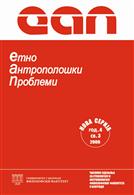Unutardisciplinarni afiniteti postmoderne antropologije, deo I: posledice objedinjavanja etike, politike i metodologije u kritičkoj antropologiji 1960-ih
The Intradisciplinary Affinities of Postmodern Anthropology Part I. The Consequences of Merging Ethics, Politics and Methodology in 1960s Critical Anthropology
Author(s): Miloš MilenkovićSubject(s): Politics, Anthropology, Gender Studies, Ethics / Practical Philosophy, Recent History (1900 till today), Methodology and research technology
Published by: Филозофски факултет, Универзитет у Београду
Keywords: history of anthropology; intradisciplinary interdisciplinarity; critical anthropology; postmodern anthropology; knowledge politics; anthropology of anthropology;
Summary/Abstract: The paper offers an alternative interpretation of the genesis of the literary turn in anthropology, as an "interim solution" in the context of the ideological incorrectness of radical anti-colonial theories in a liberal democracy. Critical anthropology in the 1960s and 1970s drew considerable inspiration from reformational currents in neo-Marxist sociology and social philosophy, arousing ideological opposition among the numerous participants of methodological debates. This opposition would prove crucial for their subsequent modest development. This activistic ideological ballast actually slowed down the development of potent externalist analyses of the social determination of anthropology and academe in general, leaving room for studies of ethnographic writing. Anticipating, in terms of themes and trends, "nonmethodological" solutions to methodological problems, it had a direct effect on the substitution of poetics and contextual reflection for methodological regulation. Thus, paradoxically, extremely externalistically oriented analyses, which attempted to merge ethical, political and methodological debates, reduced the methodological focus of the disciplinary community from issues of research objectivity and the reliability of ethnographic records to issues concerning style and the writing of anthropology. In this context, debates on relativism, realism, representation, authority and reflexivity, typical of 1980s postmodern anthropology, have become a socially acceptable alternative to the critical and neo-Marxist anthropology of Afro-Americans, feminists or of the otherwise oppressed/studied when they in turn become nativistic anthropologists. The "literary turn" in postmodern anthropology is generally interpreted as an externalist critique of traditional ethnographic realism, offering an ethical and political interpretation of reflexivity as per se more correct than traditional positivist ethnography.
Journal: Етноантрополошки проблеми
- Issue Year: 4/2009
- Issue No: 3
- Page Range: 103-115
- Page Count: 13
- Language: Serbian

